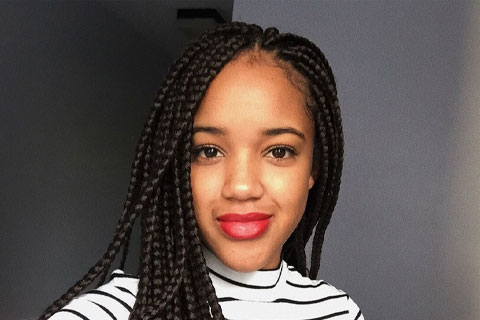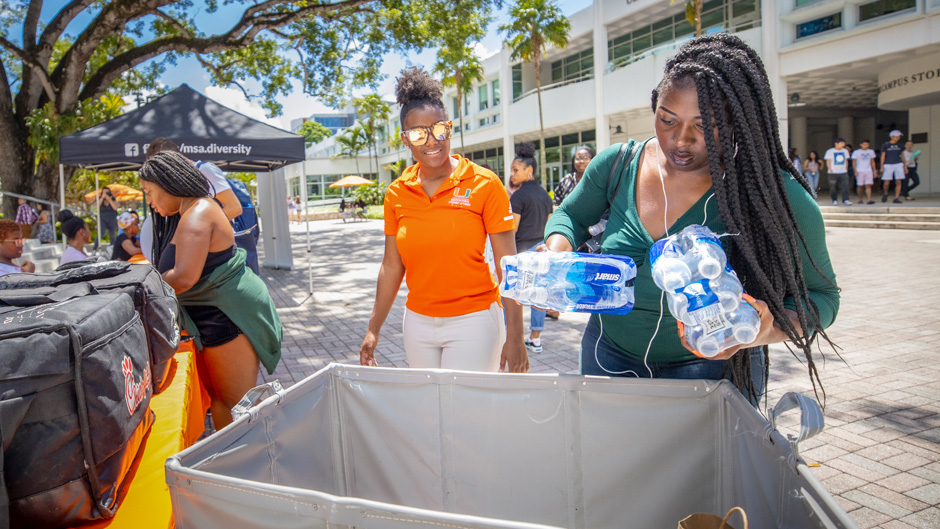As soon as images and stories began to emerge from the Abacos and other Bahamian islands ravaged by Hurricane Dorian, Katya Saunders felt obligated to respond.
As president of the Bahamian Students Association at the University of Miami, the relief mission isn’t just business—it’s personal.
“It’s very important to me because I’m not able to be there to help or lend a hand,” said Saunders, a public relations major in the School of Communication. “I feel like I need to do whatever I can from the University. I feel very compelled.”
The international student was “born and bred” in Nassau, Bahamas. Through social media, she and her peers located outside of the path of Hurricane Dorian have been able to play a major role in helping to reconnect missing people from the islands devastated by the catastrophic storm with their families. Of her family and friends, all have “thankfully, been reported safe.”
“I’ve been glued to my phone,” Saunders said. “I feel like that is the least that I can do as a Bahamian abroad. I wouldn’t be able to live with myself if I didn’t.”
At UM, there are 18 students from the Bahamas. English graduate student Barry Williams is a Nassau native with an aunt and uncle who live in Freeport on Grand Bahama island. Although Williams was very concerned for their safety, he kept in touch with them through the family’s WhatsApp group chat and said his aunt and uncle were fortunate to survive without much damage to their home.
Luckily, Williams’ parents were safe on New Providence island, where Nassau is located, yet he said the amount of damage Hurricane Dorian inflicted was a wake-up call for Bahamians. In the past, many storms would blow through quickly and damage was more limited so people would stay home, he said. But with the length of time Dorian lingered over the Bahamas, many of his friends said that next time they will secure their homes and leave.
“I don’t think anybody could fathom the amount of damage this hurricane has done,” he said. “To sit there and stall, and wreak havoc the way that it did, we have not experienced a hurricane like that before so I think we’ll see a difference in the way Bahamians react to and prepare for hurricanes in the future.”
Saunders said this storm is the worst thing that has happened to their island nation.

“We are all just shocked,” said Saunders. “There is nothing we could have done to prepare for this. When you have 20 feet of seawater coming into your home—it’s just getting over the shock at just how fast everything has gone to ruins.”
On campus, the response by students eager to donate has been impressive, according to Renee Dickens Callan, executive director of student life, who also said a donation area in the Whitten University Center “began to overflow with donated items” earlier Tuesday.
“It means a lot to me to know that these items were just sitting in my room and I know someone in need can use them a lot more than I could,” said Makelsey Page, a marine science and biology major.
From Sept. 5-13, the Bahamian Students Association, in collaboration with the Caribbean Students Association, the Office of Multicultural Student Affairs and the William R. Butler Center for Volunteer Service and Leadership Development, have teamed up to coordinate a Bahamas Hurricane Relief Drive. The drive is seeking items including toiletries, canned goods, water, duct tape, garbage bags and more.
Kennedy Robinson, assistant director of the Office of Multicultural Student Affairs, said the outpouring of support has been amazing, as students have shown an incredible amount of desire to assist.
“Being able to assist them and help them and bring their vision to life while making it fun by including our Culture Pop event as well is so exciting,” said Robinson. “A lot of students are looking for things to do and give back and to help out. This is the perfect opportunity to be able to collaborate and seeing everyone come together is really powerful.”
Andrew Wiemer, director of the Butler Center, isn’t surprised at how quickly students have stepped up to serve their community.
“We have unfortunately had many situations across the globe that have been impacted by natural disasters,” said Wiemer. “However, each time I’ve seen the students band together to give back and support any community that has been affected. Our student body always answers the call each time and it is evident our family of ’Canes care and continue to give back to the global community.”
Last week, UM President Julio Frenk announced the launch of The U Responds: Hurricane Dorian Response Fund, a university-wide coordinated effort to raise funds for areas impacted by Dorian.
For students interested in dropping off new/unused items for the Bahamas Hurricane Relief Drive, drop boxes can be found at the Whitten University Center lower lounge, in the lobby of each residential college during tabling events, and on Sept. 13 at the Student Center Complex Rock Plaza between noon and 2 p.m.
“There’s a lot of bad that’s happened during the past week, but we’ve seen so much good throughout the world,” said Saunders. “We’ve all come together to find missing people, donate money. We are a tiny country, but we have shown that we have our own backs. The rebuilding process is going to be hard and long but it’s necessary and it’s doable.”
Janette Neuwahl Tannen contributed to this report.

